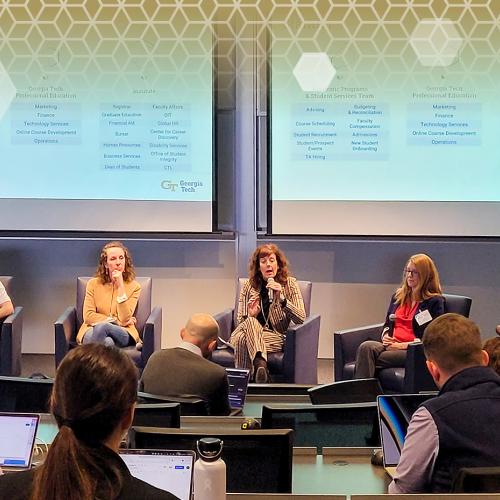Digital Accessibility, Equity, and Inclusion in a Post-COVID World
Microsoft seeds grant for Accessquity, a higher ed summit addressing technology, design, and resources for digital accessibility

Georgia Tech’s Center for 21st Century Universities (C21U) announced four winning proposals for a new accessibility-focused seed grant research program funded by Microsoft. Among them is one research project entitled, “Accessquity: Digital Accessibility, Equity, and Inclusion in a Post-COVID World, led by Yakut Gazi, associate dean of Learning Systems at Georgia Tech Professional Education (GTPE), along with Chaohua Ou, assistant director of learning and technology initiatives for the Center for Teaching and Learning; Matt Lisle, director of digital learning technologies at the Center for 21st Century Universities (C21U); and Warren Goetzel, interim associate director of academic technologies at the Office of Information Technology.
The GT-Microsoft Accessibility Research Seed Grant Program was open to proposals from all Georgia Tech faculty, staff, and students for accessibility-focused research and projects, offering up to $45,000 in funding for every winning proposal.
The winning proposals reflect a wide range of subjects relating to digital accessibility and assistive technology and research, including accessible art exhibits, computer science, and music education for visually impaired students, digital access and equity as impacted by the Covid-19 pandemic, and technology-mediated mentoring for research students with disabilities.
Gazi, Ou, Lisle, and Goetzel's proposal exemplifies these characteristics in its focus on digital accessibility and equity in K-12 and higher education. Since the education crisis resulting from Covid-19, the gaps in digital accessibility that had largely been ignored beforehand have been exposed and exacerbated.
"Addressing the impacts of Covid-19 is one of the biggest challenges facing educators right now," notes the PI's in their grant proposal. "The universal design approaches that have been advocated by proponents of accessibility as principles that not only serve the populations that need accommodations, but all learners have come to the forefront of the conversation as we started asking questions related to humane, equitable, empathetic teaching during and beyond the pandemic."
The project would address this problem by organizing a summit for higher education researchers, administrators, faculty, and students around the country to come together. The summit would facilitate discussion and collaboration among these leaders to develop solutions to address the needs in digital accessibility, equity, and inclusion, termed “Accessquity,” for students and households nationwide.
The ultimate goal of the summit is to create “roadmap” of all possible solutions and plans to achieve them, which could be used as a resource for instructors, educational psychologists and technologists, learning scientists, accessibility specialists, researchers in human-computer interaction, and any others interested in digital accessibility in education.
“Georgia Tech’s Strategic Plan asks our campus, locally and globally, to work together to create an inclusive environment that cultivates the well-being of all members of our community,” said Steve Harmon, interim director of C21U and associate dean of research at GTPE. “Accessibility is a critical piece of this work, and we feel confident that these research projects will expand access and remove barriers to success for current and future Yellow Jackets.”

